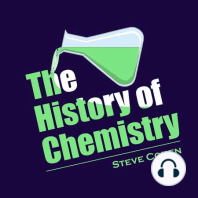18 min listen
48: Food for Thought
ratings:
Length:
22 minutes
Released:
Jan 12, 2023
Format:
Podcast episode
Description
Once chemists realized that Staudinger was right, that molecules could be huge, protein research zoomed ahead. We hear of Gilbert Adair's study of hemoglobin, of the battle James Sumner had over the crystallization of urease with Richard Willstätter, and then the huge research William Astbury did on various keratin structures. Linus Pauling enters our story with his amazing work on the alpha-helix and beta-sheet generic forms that proteins take. Finally, Pauling announced in 1945 the first known genetic disease, sickle-cell anemia.Support the show Support my podcast at https://www.patreon.com/thehistoryofchemistry Tell me how your life relates to chemistry! E-mail me at steve@historyofchem.com Get my book, O Mg! How Chemistry Came to Be, from World Scientific Publishing, https://www.worldscientific.com/worldscibooks/10.1142/12670#t=aboutBook
Released:
Jan 12, 2023
Format:
Podcast episode
Titles in the series (100)
5: The Rise of Khemeia by The History of Chemistry
